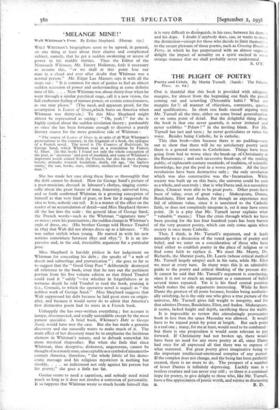`MELANGE MINE ' Walt Whitman's Pose. By Esther Shephard. (Harrap.
iss.) WALT WHITMAN'S biographers seem to be agreed, in general, on one thing at least about their elusive and complicated subject, namely, that he got a sudden awakening or access of power in his middle thirties. Thus the Editor of the Nonesuch Whitman, Mr. Emory Holloway, feels it necessary to assume this, " or we shall at this point lose our man in a cloud and ever after doubt that Whitman was a normal person." Mr. Edgar Lee Masters says it with all the stops out : " It is common for men of genius to feel an almost sudden accession of power and understanding at some definite time of life. . . . Now Whitman was about thirty-four when he went through a similar psychical stage, call it a new vision, the full exuberant feeling of mature power, or cosmic consciousness, as one may please." (The need, and apparent proof, for the assumption is Leaves of Grass,which burst on America when Whitman was thirty-six.) To this Miss Shephard might almost be represented as saying : " Oh, yeah ! " for she is highly cynical about the sudden revelation theory ; pardonably so since she has been fortunate enough to discover a purely literary source for the more grandiose side of Whitman : "The source of Leaves of Grass is, in spite of all Walt Whitman's protestations to the contrary, in the fragment of a book, the epilogue of a French novel. The novel is The Countess of Rudolstadt, by George Sand, which Whitman read in a translation by Francis G. Shaw. (In this book) I found not only the whole conception of the poet, as ' answerer' and poet of mankind, and some of Whitnian's important words coined from the French, but also his most charac- teristic attitudes towards feudalism, death, old age, ' the highest sanity,' the sun, books, stars, children, motherhood and `the young man '."
She has made her case along these lines so thoroughly that the debt cannot be denied. How far George Sand's picture of a poet-musician, dressed in labourer's clothes, singing cosmi- cally about the great future of man, fraternity, universal love, and so forth confirmed Whitman in a growing conception of himself as that very kind of poet; or how far it suggested the idea to him, nobody can tell. It is a matter of the effect on the reader of an accumulation of detail—and Miss Shephard throws all she has into the scale : the general ideas of George Sand; the French words—such as the Whitman ccsignature tune en masse; even his punctuation; the sudden change in Whitman's style of dress, etc. (His brother George told Horace Traubel in 1893 that Walt did not always dress up as a labourer. " He was rather stylish when young. He started in with his new notions somewhere between 185o and r855.") It is an im- pressive and, in the end, irresistible argument for a particular pose. •
Miss Shephard is harshly pitiless in her judgement on Whitman for concealing his debt ; she speaks of " a web of deceit and subterfuge and prevarication " ; she goes so far as to suggest that the " Good Gray Poet " deliberately destroyed all reference to the book, even that he tore out the pertinent portion from his five volume edition so that friend Traubel could read it " safely "—for whether in forgetfulness or in tortuous deceit he told Traubel to read the book, praising it
Consuelo, to which the operative novel is sequel) as " the noblest work of George Sand." Miss Shephard suggests that Walt suppressed his debt because he laid great store on origin- ality, and because it would never do to admit that America's first distinctive poem had its roots in a French book.
Unhappily she has over-written everything ; her account is jumpy, disconnected, and totally unreadable except by the most patient specialist. A brief book, Whitman's Debt to George Sand, would have met the case. But she has made a genuine discovery and she naturally wants to make much of it. The main effect of her discovery must be to emphasise the factitious element in Whitman's nature, and to debunk somewhat his
more mystical rhapsodies. But when she feels that since Whitman, thus deceptive, dishonest, ungenerous, cannot be thought of as a manly man, unacceptable as a symbol of nineteenth- century America, therefore, " the whole fabric of his demo- cratic message and his religious mysticism is nothing but shoddy, . . . an indictment not only against his person but his poetry," she goes a little too far.
Genius seems to need a caparison, and nobody need mind much so long as it does not involve a' corrosion of personality. It so happens that Whitman wrote so much beside himself that
it is very difficult to distinguish, in his case, between his dmm, .1 and his dope. I doubt" if anybOdy does, can, or wants to matc'z the distinction—eiceept for those who decide to linut themseh s to the secure pleasure of those poems; Inch as Crossing Brooki. Ferry, in which he has perpetuated with an almost •orgiastic delight the impact of actuality on a spirit excited in some strange manner that we shall probably never understand.
S. O'F.






































 Previous page
Previous page